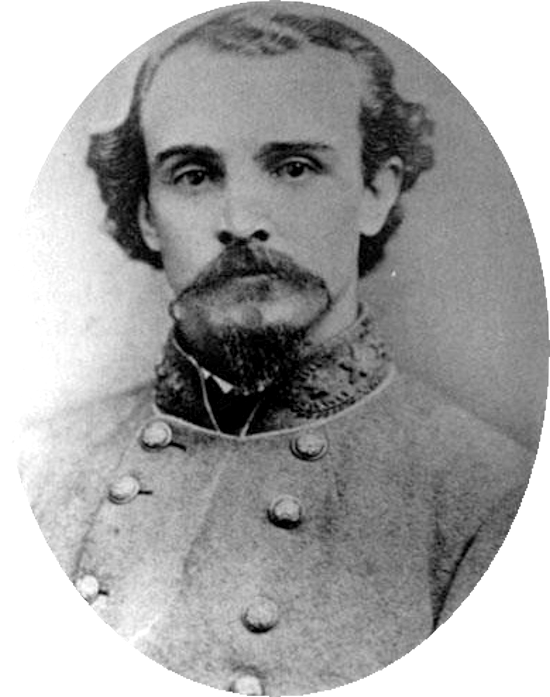| Previous Facts & Stories | Facts & Stories Index | 16th OVI Home Page | Next Facts & Stories |
of the 16th Ohio Volunteer Infantry
But Fate Would Not Be Kind To Them
August 6, 1862
Two soldiers from Captain Joseph Edgar's ill-fated Company B escaped harm and capture at the Battle of Tazewell, Tennessee, on August 6, 1862. While making their way back through enemy territory to their regiment, camped north of Tazewell, they came upon a Confederate Colonel on horseback. Words and threats were exchanged but the Colonel surrendered to the two who escorted him back through the Rebel troops, triumphantly delivering him to Col. John F. DeCourcey. This prize was instrumental in a prisoner exchange a few days later. Read and additional account at
Got the Colonelas well as the Orrville Crescent article of August 24, 1886, below.
As fate would have it, the two soldiers, Privates John McCluggage and Corporal Paul Wilder, were not allowed to tell their colorful story to friends and family through the years. Corporal Wilder was rewarded for the capture by being promoted to Sergeant, that same day. But he was wounded at the Battle of Chickasaw Bayou, less than five months later, and died of those wounds exactly six months later, on February 6, 1863, in a hospital at Paducah, Kentucky. Similarly, John McCluggage was also wounded at Chickasaw Bayou and died of his wounds on January 13, 1863, on board the hospital ship D. A. January on the Mississippi River.
Below is a photo of Confederate General John Brown Gordon, Lt. Colonel of the 11th Tennessee Volunteer Infantry at the time, captured by Corporal Paul Wilder and Private John McCluggage, at Tazewell on August 6, 1862. Below the photo is a brief biography of General Gordon.

Gen. John Brown Gordon
Brigadier-General John Brown Gordon, one of the youngest of the Confederate general officers, was born in Giles county, Tenn. He was graduated at the Western military institute at Nashville in 1859.
At the outbreak of the civil war he entered the service of his native State as drill-master for the Eleventh Tennessee infantry, which with other troops was soon after turned over to the Confederate authorities. He was successively made captain, then lieutenant-colonel, and finally colonel of this regiment (December, 1862).
While serving in east Tennessee in the summer of 1862 he was captured at Tazewell, but being soon exchanged he participated in the Kentucky campaign. Just after receiving his commission as colonel he led his men in the fierce battle of Murfreesboro. In this engagement he was again captured, but was back with his command at the battles of Chickamauga and Missionary Ridge, winning fresh laurels on these famous fields.
In Cheatham's division during the arduous Dalton-Atlanta campaign, he and his men sustained their reputation for valor and efficiency, and on August 15, 1864, he was commissioned brigadier-general, succeeding A. J. Vaughan. He commanded his brigade at Jonesboro, and in the fearful battle at Franklin on the afternoon of November 30, 1864, in which fell the flower of the army of Tennessee, Gordon led his brigade in an impetuous charge upon the Federal works, he and his men being the first to reach the parapet and pierce the enemy's lines.
But such masses of Federals were poured upon them at this point that they were forced back over the parapet, Gordon and some of his men having held on so stoutly as to be captured by the enemy within their lines. He remained a prisoner of war until August, 1865, and was then released on parole.
Returning home, General Gordon took up the practice of law. In 1883 he was appointed one of the railroad commissioners of Tennessee. In 1885 he was appointed to a position in the interior department of the United States government, and served four years among the western Indians. In 1892 he became superintendent of the public schools of the city of Memphis.
Source: Confederate Military History, vol. X, p. 309
John Gordon went on to serve two terms as a United States Senator from Georgia, becoming the first ex-Confederate to preside over the U.S. Senate. He also was elected governor of the state of Georgia. As a sad addendum to Gordon's story, it is reported that he became active in the Ku Klux Klan movement in Tennessee in 1866 and 1867, although his statements indicate he did not support the violent acts which turned out to be a trademark of the organization.
37 Years Later
Below is a letter to the Weekly Kansas Chief newspaper, published July 20, 1899, from 16th Ohio soldier David Kercher, a former Private of Company C. Kercher makes note that former Confederate John Brown Gordon was to speak at some event and relays his wartime history with Gordon at the Battle of Tazewell, Tennesse. The article was contributed by 16th OVI researcher Rob Garber:


| Previous Facts & Stories | Facts & Stories Index | 16th OVI Home Page | Next Facts & Stories |